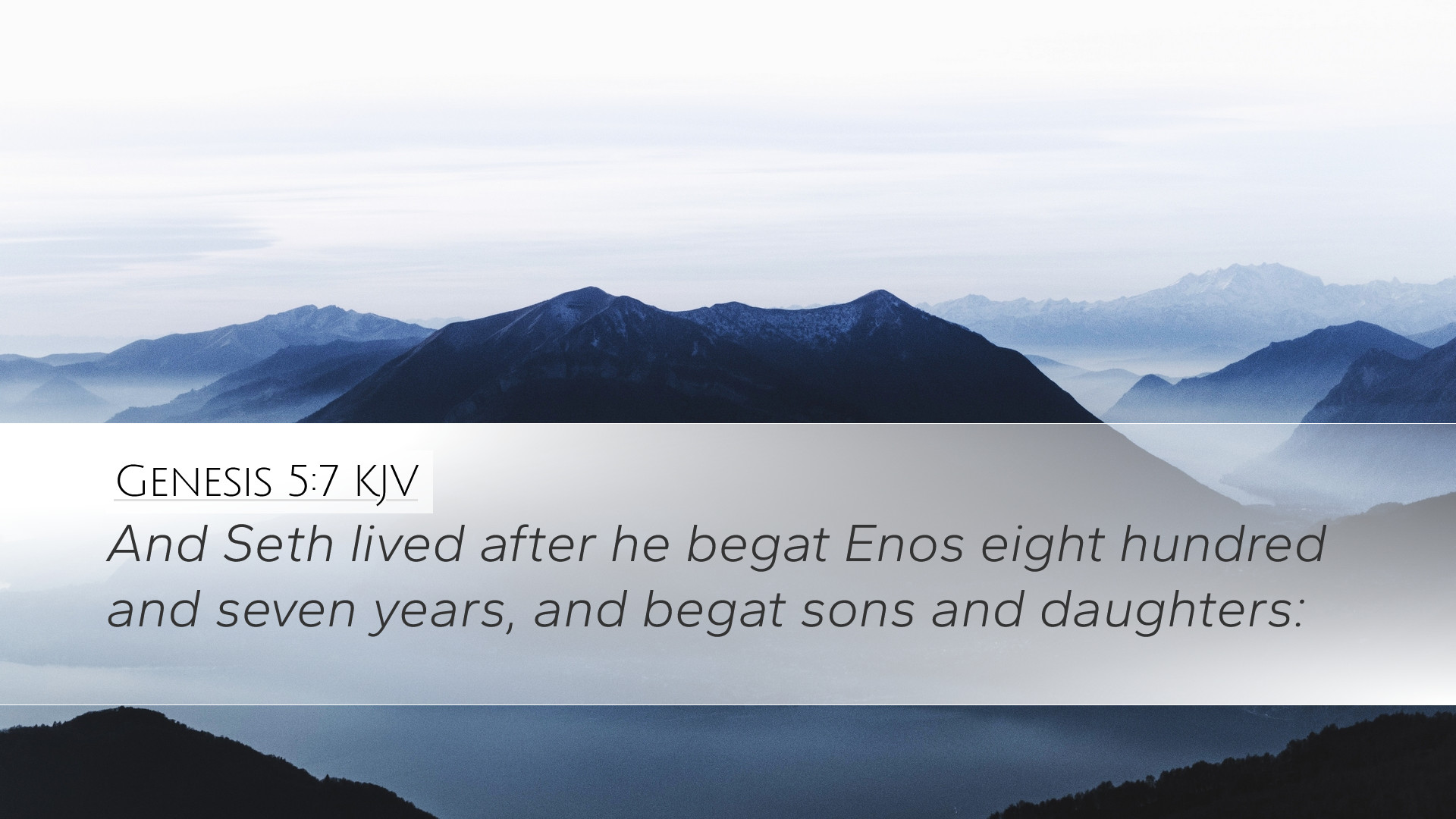Commentary on Genesis 5:7
Genesis 5:7: "And Seth lived after he begat Enos eight hundred and seven years, and begat sons and daughters."
Introduction
This verse is situated in a genealogical context within the larger narrative of Genesis 5, which chronicles the lineage from Adam to Noah. This passage provides critical insight into humanity's early generations post-Fall and highlights the continuity and expansion of the human race through Seth, the chosen line of Adam.
Historical Context
The genealogy in Genesis 5 serves multiple purposes: it preserves the names and records of those who lived during this early time, offers a reiteration of God’s judgment on sin, and emphasizes the importance of righteous heritage through the line of Seth, especially in contrast to the lineage of Cain.
The Significance of Seth
Seth, whose name means "appointed," was born as a replacement for Abel, who was killed by Cain. Matthew Henry notes that Seth represents God’s provision for humanity's salvation and righteousness amidst the backdrop of sin. Each generation that followed must remember the hope for redemption that Seth embodies.
The Longevity of Life
This verse mentions Seth living for an additional 807 years after the birth of Enos. This extraordinary lifespan reflects the conditions of early creation, where humanity enjoyed prolonged lives. Adam Clarke emphasizes how these long life spans were indicative of God's original design and the closer proximity to the time of creation, allowing for the accumulation of wisdom and experience.
The Birth of Enos
Enos, whose name means "mortal" or "frail," suggests a recognition of humanity's limitations and dependency on God. Albert Barnes remarks that this name change serves as a reminder of the fallen nature of humanity and establishes a context where prayer and worship become increasingly vital. It shows that the awareness of sin led to a more profound sense of need for divine assistance.
Generational Impact
The mention of Seth's sons and daughters illustrates God's command to "be fruitful and multiply." This continues the theme established in Genesis 1:28. Pastors and theologians can glean from this that family and generational heritage carry significant spiritual weight, influencing future generations and the collective relationship with God.
- Theological Reflection: Each family represents a microcosm of the church; one generation influences the next.
- Pastoral Application: Emphasizing the importance of nurturing faith within families to ensure the passing down of values.
- Spiritual Legacy: Recognizing the duty to foster a legacy of faith amidst increasing secularism.
The Importance of Names
Analyzing the names throughout genealogies, scholars note their significance as reflective of character and divine purpose. The name Enos, coupled with Seth's lineage, emphasizes the spiritual inheritance imparted to successive generations, which carries implications for contemporary believers' understanding of their spiritual lineage in Christ.
The Call to Holiness
This passage, while focused on lineage, can also encourage contemplation regarding holiness and righteous living. Each figure's life and actions can exhort believers to strive for godliness, as every life is a testament to the ongoing story of redemption. Adam Clarke reminds us that the mention of "sons and daughters" implies there was a community of faith, and as such, believers today are called to sustain and nurture such communities.
Conclusion
Genesis 5:7 serves as a pivotal reminder of God's ongoing purposes through the generations. The emphasis on Seth's life post-Enos' birth showcases a moment of divine continuity and the profound significance of each generation in fulfilling God's covenantal promises. Pastors, students, and scholars are called to reflect on their place within this ongoing lineage and consider how they might contribute to the spiritual heritage passed down through the ages.


